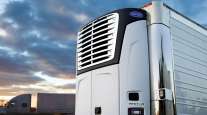Electric-Powered Reefer Units Gaining Momentum
As truck manufacturers and suppliers begin to move toward electric-powered vehicles and components, the same trend is emerging for trailer refrigeration.
Suppliers of transport refrigeration units are quickly moving down this path as they design and test prototypes and introduce some of the industry’s first electric products.
These developments have been driven by customer demand for increased efficiency and lower maintenance costs, and by emerging regulations which would ban diesel exhaust emissions from reefer units.
Carrier Transicold offers refrigeration systems with all-electric standby capability when parked for loading or unloading.

Carrier Transicold has incorporated electric power capabilities into its Vector trailer refrigeration systems. (Carrier Transicold)
This enables the unit to run without requiring use of a diesel engine, said David Brondum, the company’s director of product management and sustainability. “This conserves fuel while eliminating refrigeration unit engine emissions and noise,” he said. “And use of electric standby also reduces operating costs by 40-70%, depending on the cost of fuel.”
Brondum also noted that when electric standby is used, engine run-time is reduced, helping to extend maintenance intervals. Another advantage of electric standby capability is that when a reefer trailer is parked for loading, unloading or staging, it can be operated via an electric power source, providing full refrigeration capacity while eliminating noise and emissions from the refrigeration unit and saving fuel.
Electric-powered reefers also are a potential answer to compliance with new reefer emissions reduction mandates being promoted by the California Air Resources Board.
Thermo King recently announced a partnership with electric-vehicle manufacturer Chanje to collaborate on an all-electric step van for refrigerated deliveries. The prototpye, a version of Chanje’s V8100 all-electric medium-duty panel van, is equipped with a Thermo King V-520 RT refrigeration unit and ThermoLite solar panels.
“Our work with Chanje is one of several examples of how we are strategically focusing our investments and partnerships to evolve technology that will innovate our products to deliver the right solutions at the right time for our global business base,” Dane Taival, Thermo King vice president and general manager for transport solutions in North America, said in a statement.
Thermo King said it was the first company to offer European customers hybrid and nondiesel truck and trailer refrigeration units. Currently, more than 20,000 trucks and trailers are on the road with these all-electric technologies, the company said.
The global refrigerated vehicle market is expected to reach $16.5 billion by 2022, said Ian Televik, director of marketing for Chanje.
“In the U.S., we are seeing increasing demand for medium-duty, last-mile refrigerated solutions due to a steady increase in consumers doing their shopping online and expecting fast home deliveries,” he said in a news release. “This was a key reason why we partnered with Thermo King to create a vehicle to meet this ever-growing demand.” ³




